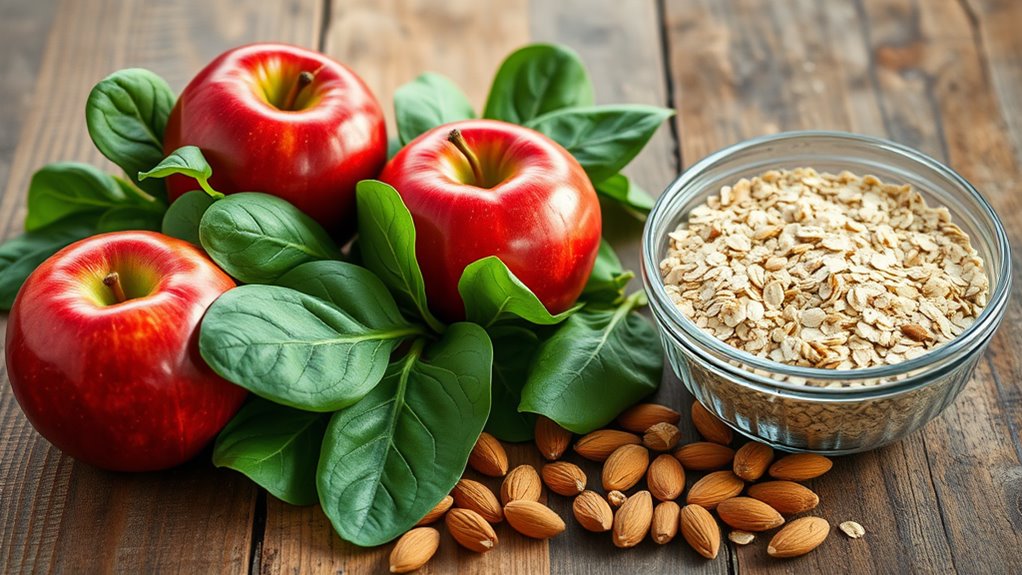Everyday Foods That May Naturally Support Your Health Goals
You can easily incorporate everyday foods like berries and leafy greens to support your health goals, as they’re packed with antioxidants and vitamins that fight inflammation. Nuts, seeds, and fatty fish add heart-healthy fats and omega-3s, while whole grains offer steady energy. Now, let’s explore how these choices might fit into your routine and what other options could enhance them.
Berries for Antioxidant Benefits
Berries, like blueberries and strawberries, deliver a potent dose of antioxidants that shield your cells from damage.
As part of whole food wellness, you’re integrating these fruits to fight oxidative stress and bolster your immune system. Research supports their role in reducing inflammation and aiding heart health, so you add them to meals like yogurt or snacks for practicality. Additionally, their high content of vitamin C enhances collagen production, promoting healthy skin and connective tissues. Balance this by varying your diet for sustained benefits.
Leafy Greens to Boost Nutrient Intake
You boost your nutrient intake by adding spinach and kale to your meals, as they’re packed with essential vitamins like A, C, and K.
These leafy greens provide a practical way to support your health without replacing a varied diet. Incorporating these greens can also help you get essential nutrients that many individuals overlook.
Start with small portions in salads or stir-fries to experience their benefits firsthand.
Nutrient-Rich Spinach
Spinach, a versatile leafy green, stands out for its exceptional nutrient density, offering a simple way to amp up your intake of vitamins A, C, and K, along with iron and antioxidants.
You’ll boost your energy by adding it to eggs or pasta, supporting red blood cell production. Its anti-inflammatory properties aid overall wellness, but balance it with varied foods for sustained health benefits.
Kale Vitamin Boost
Kale, a nutrient-packed leafy green, delivers a robust vitamin boost with high levels of A, C, and K, plus antioxidants that support immune function and reduce inflammation.
You can easily incorporate it into salads or smoothies to enhance your daily nutrient intake, promoting better eye health and energy levels.
Balance this with varied foods, as no single item guarantees results. Always consult experts.
Nuts and Seeds for Heart Health Support
You boost your heart health by including nuts in your diet, as their omega-3 fatty acids help lower inflammation and improve blood flow. Seeds contribute antioxidant effects that protect against oxidative stress, supporting overall cardiovascular function. Additionally, superfoods for anti-inflammatory health can enhance your diet, providing even more benefits for heart health.
Nut Omega-3 Benefits
While nuts and seeds like walnuts, flaxseeds, and chia seeds are rich in Omega-3 fatty acids, they actively support heart health by reducing inflammation and improving cholesterol levels.
You can incorporate them into your meals, like adding flaxseeds to smoothies, to lower triglycerides and enhance blood flow.
Research shows consistent intake reduces heart disease risk, but you must balance this with exercise and a varied diet for best results.
Seed Antioxidant Effects
Seeds like chia and flaxseeds deliver potent antioxidants, such as polyphenols, that actively combat oxidative stress and inflammation to support heart health.
You can incorporate them into your daily meals, like adding to smoothies or salads, for practical antioxidant intake.
Evidence suggests these seeds enhance heart function when part of a varied diet, but they’re not a cure-all—moderation is key.
Heart Risk Reduction
Nuts and seeds, such as almonds and flaxseeds, actively reduce heart disease risk by lowering cholesterol and inflammation, as supported by numerous studies.
You can incorporate them into your diet by adding a handful to salads or snacks, leveraging their omega-3s and fiber for better blood flow.
Balance this with varied foods and exercise; they’re not a cure but a practical, evidence-backed ally for your heart health.
Fatty Fish for Omega-3 Essentials
Fatty fish, such as salmon and mackerel, deliver essential Omega-3 fatty acids that boost your heart health and cognitive function.
You’ll reduce inflammation by adding them to your diet; studies link Omega-3s to lower heart disease risk. Additionally, these fatty fish are rich in immune-boosting nutrients that can enhance your body’s defense mechanisms.
Aim for two servings weekly, but balance with variety to minimize mercury exposure while reaping these evidence-based benefits.
Whole Grains for Sustained Energy Levels
Whole grains, such as oats and quinoa, fuel your body with complex carbohydrates that release energy gradually, helping you avoid midday slumps.
They’re backed by studies showing improved blood sugar control for steady energy.
- Swap refined grains for whole ones to stabilize your energy levels.
- Start your day with oatmeal to enhance focus and reduce fatigue.
- Incorporate quinoa into meals for its nutrient density and prolonged vigor.
- Choose whole grain options like barley to support active lifestyles effectively.
In addition to their energy benefits, whole grains also provide essential nutrients that are often more bioavailable than those found in supplements.
Fermented Foods for Digestive Wellness
Fermented foods, such as yogurt and kimchi, boost your digestive health by introducing beneficial probiotics that balance gut bacteria.
Research shows they promote a diverse microbiome, easing bloating and enhancing nutrient absorption. Additionally, immune-boosting foods can work synergistically with fermented options to strengthen your body’s defenses against common illnesses.
You’ll benefit by adding them to meals, like kefir in smoothies or sauerkraut in salads, but balance with a varied diet and consult experts, as effects vary individually.


